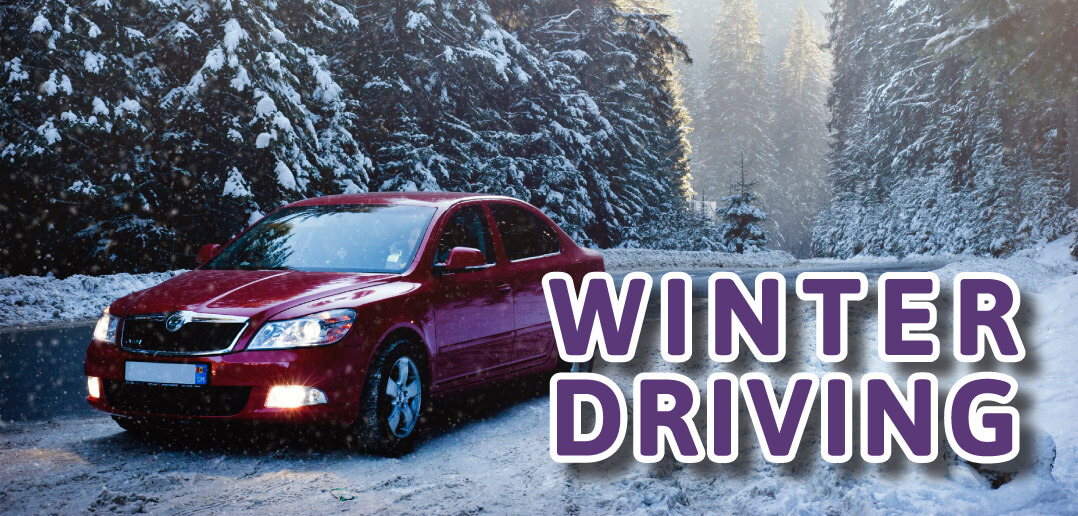Winter Driving in Omaha, NE – 2018
No matter how long a person lives in Nebraska, the unpredictable weather here still seems to come as a bit of a shock. However, one thing we can predict is that winter hits us hard. We may not know when it’ll hit, but we know it surely will—and so it’s something we need to be prepared for, especially when it comes to our vehicles and navigating the roads in icy, slick conditions. Let’s review what we can do to prepare for road conditions that lie ahead of us for the next few months.
With the help of a few local experts, we’ve gathered some helpful information and tips for winter driving in Omaha.
Having your vehicle break down is never convenient, but it’s worse in the winter when it’s cold and the days get darker faster. So, if your vehicle is due for regular maintenance services, get it done now. Since bad hoses, belts, water pumps, and spark plug wires can leave you stranded, it’s better to take care of them before cold weather really hits.
Don’t forget to have your battery checked, either. If it has marginal cold cranking amps, have your technician load test the battery with a carbon pile tester. Especially if you drive a newer vehicle; newer batteries will not always give you the courtesy of a slow crank time before they fail.
With electronic control systems, your engine can now curb carbon emissions and increase fuel efficiency. Advanced control systems have taken the place of simple engine components; therefore, it’s even more important to have trained professionals looking into your vehicle problems.
Failing to get a needed inspection can be a costly oversight, especially for businesses with operations that rely on fleet transport.
“A pre-winter inspection can identify problems that will hinder your winter driving, from brakes, tires, and suspension to antifreeze, fluids, filters, and your battery,” confirms Mark Griger, owner of Fleetmark Solutions, LLC. “At Fleetmark Solutions, we will perform a thorough inspection on your fleet vehicle and compile a report for your review with any suggestions or recommendations.
With this information a plan can be put together to ensure your vehicles stay on the road this winter.
Specializing in the maintenance and repair of commercial vehicles and fleets, Griger also offers some insight on an issue that affects diesel-powered engines:
“Diesel fuel can be a pest during the sub-freezing temperatures we experience in our area. Most of you reading this who drive or own these types of vehicles have probably dealt with this issue once before. At Fleetmark Solutions, we use BG products that are specially designed to prevent fuel gelling or waxing. We can also treat fuel storage tanks for optimal protection.”
With the necessary maintenance made, the best way to keep you and your loved ones safe this winter is simply to slow down. Going five to 10 miles an hour faster on a 15-minute trip doesn’t do you any good if you have to wait three hours for a tow truck. We’re not just talking about how hard you push the gas pedal; we’re talking about how fast you move your hands and feet. A lower-friction road surface means it takes more time for your tires to find grip and change your speed or direction. When driving in the winter, everything takes longer, particularly stopping and turning. So look farther down the road than you usually do and start breaking sooner.
Tires are literally the only components of your vehicle that (should) touch the road. This means that they are incredibly important to maintain all year long, but increasing so in bad weather. Did you know that only about 10% of your tires are contacting the road at any given time? This makes it especially important to have tires with good tread on them to grip to the road and displace water to prevent hydroplaning.
One of the best ways to keep you and your loved ones safe this winter is the obvious: drive slower and more cautiously. Unfortunately, accidents do happen, even if you are extremely careful. So, make sure you have a list of important details and contact information to keep in the glove box of each vehicle in your family. This could include your insurance agent, collision repair center, towing company, AAA membership information, emergency contact information, and even any existing medical conditions for responders. It’s good to have an actual written list in case your phone dies, doesn’t have internet connection, or gets damaged in the accident.
Matt Aerni, attorney at Berry Law Firm, also cautions, “With winter comes the additional burden of driving in inclement weather. Everyone knows weather phenomenon such as sleet or snow make our vehicles handle much different than they do when those phenomenon are not present.
Even though everyone knows that, we still see an increase in car crashes on the days when it is slick outside. Inclement weather may explain why a car crash happened, but it does not excuse the driving behavior of the person who causes the crash.
Even in winter weather, a driver has an obligation to keep their vehicle under control. When a driver slides into a snowy intersection and crashes into another car, the crash did not happen because of the snow. The crash happened because the driver did not reduce their speed in time to prevent their vehicle from sliding through an intersection the driver likely knew was slick, and that driver is going to be liable for any injuries they cause. So keep that in mind, and always remember to put the phone away while you are driving.”
Besides insurance, there are other things to keep in mind once the damage is done.
“With inclement weather comes a rise in accidents, so we are all unfortunately at a much higher risk for being involved in a collision,” emphasizes Boyd Dingman, owner of Dingman’s Collision Center.
“Hopefully this isn’t a regular incident that you are familiar with, so you may not know what steps to take or what course of action is most beneficial if you find yourself in an accident.
Every situation is different when there’s a collision, and there can potentially be damage that isn’t visible or apparent until later on down the line, so it’s beneficial to have your vehicle checked out as a result just to be on the safe side. It’s also important to note that every vehicle owner has the right to have their car repaired by a professional of choice. So many times insurance companies and their adjusters will try to direct you to a place that may not necessarily have your best interests in mind.
Dingman’s Collision Center has been serving the Omaha community for over 20 years, but dates even further back to 1960 when Francis Dingman made the decision to open his own small shop. The company’s roots are firmly planted in the commitment to holding integrity in high regard and providing the highest caliber of service.
Boyd also noted that the salt applied to the roads to help deal with the snow and ice will turn even black cars a dirty white. “Don’t attempt to wipe the salt off your vehicle without properly washing it first,” he instructs.
“Salt is very abrasive and, when rubbed into the finish, it will leave behind significant scratching. Salt can also corrode any exposed metal, so it’s essential to remove it as quickly as possible to prevent rust. Rinse your vehicle thoroughly before you begin washing to remove as much of the salt as possible to prevent it from being rubbed into the surface during the washing process. If your vehicle does experience this kind of damage, it can be repaired.
Dingman’s Collision Center is proud to offer our customers and technicians the latest in automotive refinish technology. We utilize GFS downdraft spray booths at every location ensuring the highest quality paint environment in the industry.”
There’s certainly no avoiding the winter weather, and getting used to it seems pretty hopeless as well, but there are many ways that we can set ourselves up for success in safely navigating through these cold and sometimes dangerous conditions. Know who your local professionals are in order to stay safe, covered, and prepared this winter.




